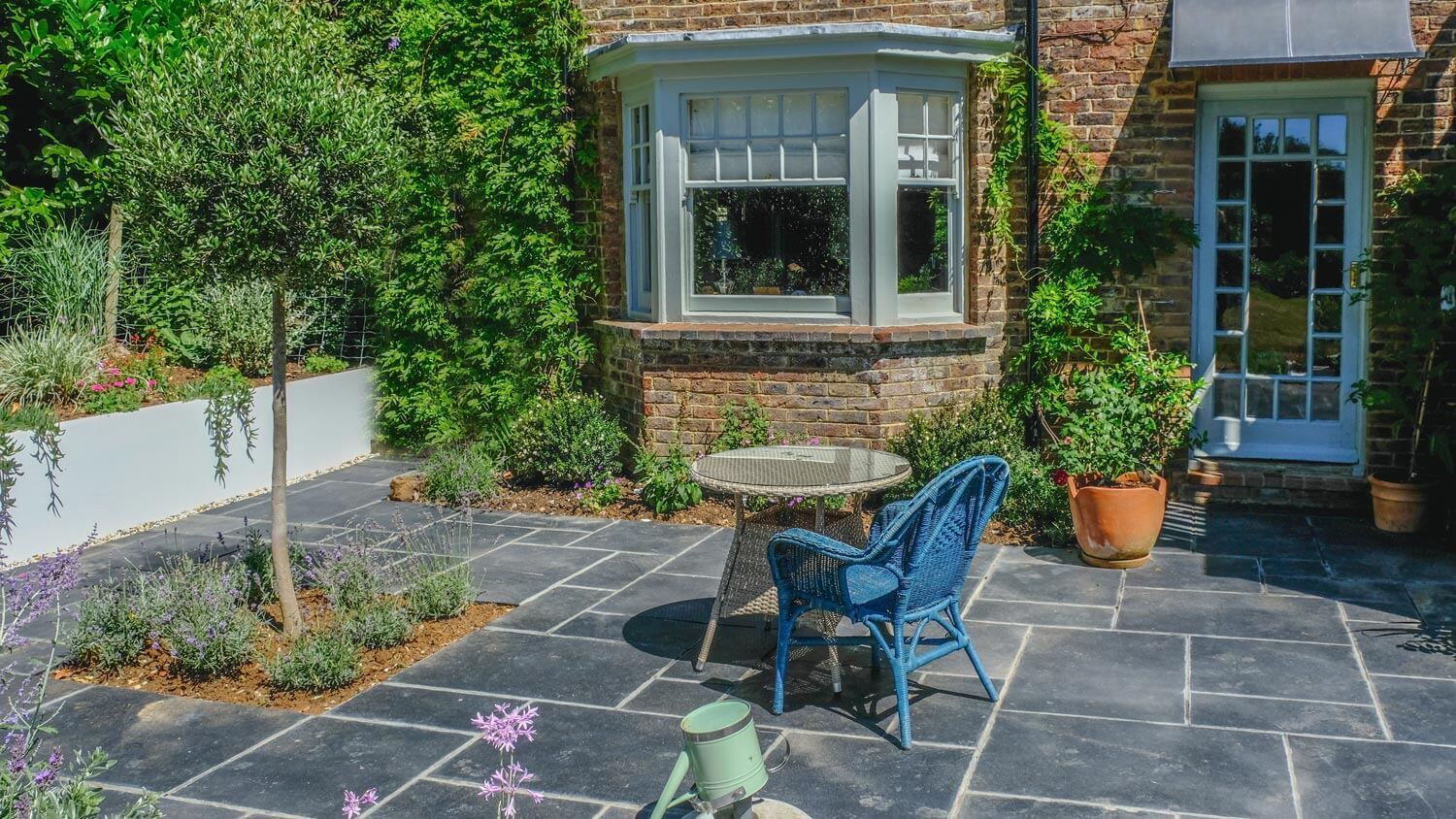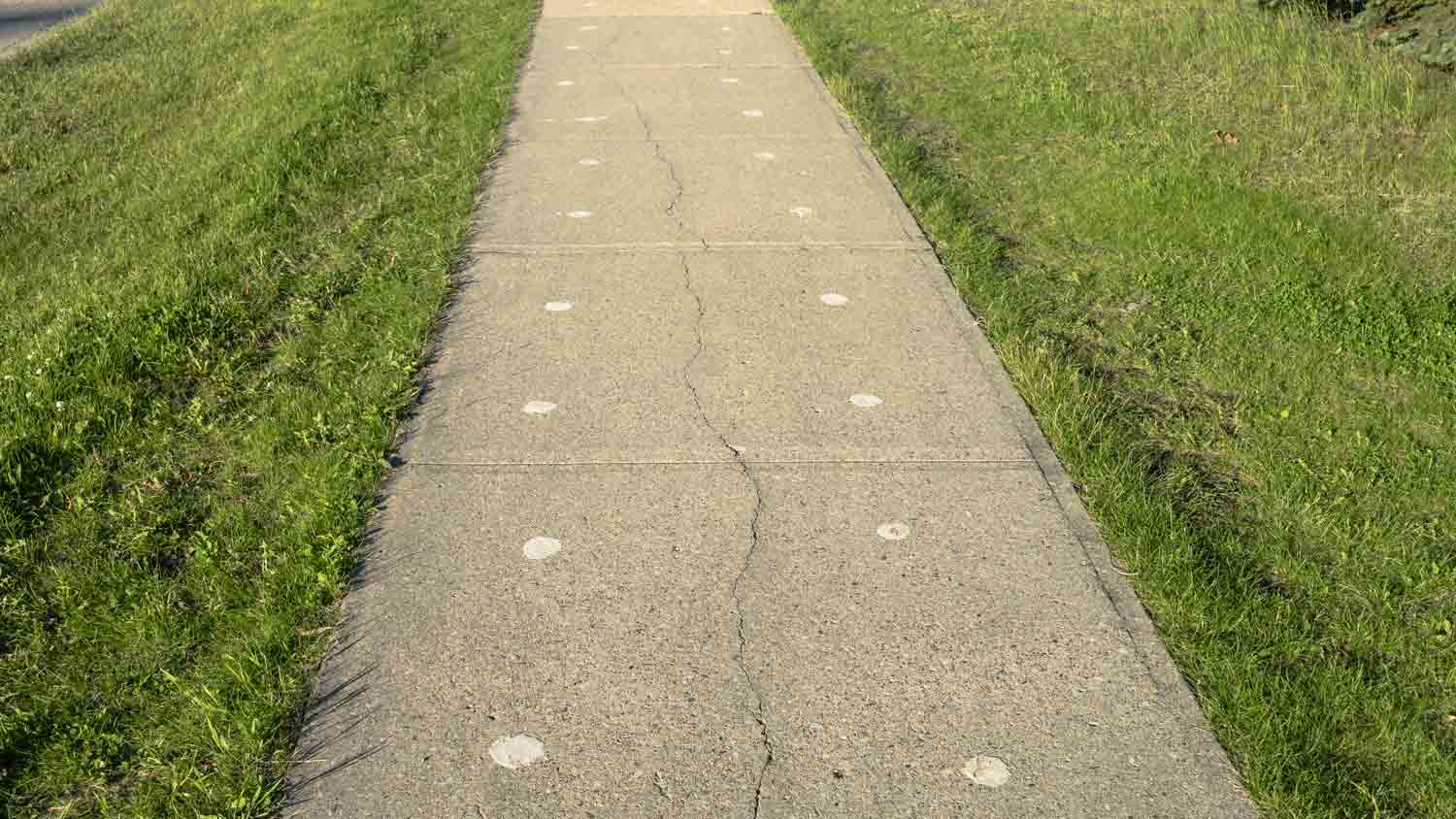
Don’t let sinking concrete capsize your budget. Learn about concrete leveling costs and the available methods to plan ahead for your project.
Concrete leveling costs depend on your project and location. Check with a local pro for your specific job.
Mudjacking lifts and levels sunken concrete by pumping a slurry beneath the slab to restore stability.
Main cost factors include the size and thickness of the slab, access challenges, and regional labor rates.
At $3 to $8 per square foot, mudjacking offers a strong return on investment compared to full slab replacement.
Completing mudjacking helps eliminate trip hazards, improve curb appeal, and prevent further damage to your property.
Preparing your site ahead of time—such as moving obstacles—can help reduce labor charges.
This article was created using automation technology and thoroughly fact-checked and edited by an Angi Editor in accordance with our AI policy.
Mudjacking cost averages $1,229, with most projects falling between $662 to $1,866. Homeowners pay $3 to $8 per square foot for mudjacking, depending on the slab’s size, type, and accessibility. Understanding these factors helps you budget for your concrete leveling project.
Mudjacking is a practical solution to fix uneven sidewalks, driveways, patios, and more. Labor costs often range from $45 to $70 per hour, and knowing what influences the final price empowers you to make the best choice for your home.
Several key factors shape the final mudjacking cost for your project. Let’s break down the most important considerations so you can plan confidently.
Mudjacking can be used on a variety of concrete surfaces. Common projects include sidewalks, driveways, patios, garage floors, foundations, and pool decks. Each type brings its own cost range, mainly due to differences in slab size, thickness, and accessibility.
Sidewalks and patios are often smaller, leading to lower overall costs, while driveways and foundations are larger and require more material and labor. For example, mudjacking a sidewalk may cost a few hundred dollars, while lifting a large driveway or foundation could approach the higher end of the range.
Compared to polyjacking—which uses polyurethane foam instead of a slurry—mudjacking is less expensive upfront, though polyjacking offers longer-lasting results and smaller drill holes. Here’s how average costs break down by project type:
| Project Type | Cost Range | Square Footage |
|---|---|---|
| Sidewalk | $300–$900 | 50–150 |
| Driveway | $800–$2,400 | 200–600 |
| Patio | $500–$1,500 | 100–300 |
| Garage Floor | $700–$2,000 | 150–400 |
| Foundation | $700–$2,000 | 200–800 |
| Pool Deck | $800–$2,500 | 150–500 |
The size of your concrete slab is one of the biggest factors in mudjacking cost. Larger areas require more material and labor, which increases the total price. Most mudjacking companies charge by the square foot, with rates ranging from $3 to $8 per square foot.
Small jobs may be subject to a minimum charge—often around $500—even if the area is less than 100 square feet. Conversely, some companies offer discounts for large projects covering several hundred square feet.
| Slab Size (Sq. Ft.) | Cost Range | Cost Per Sq. Ft. |
|---|---|---|
| 50 | $600–$700 | $12–$14 |
| 100 | $700–$1,100 | $7–$11 |
| 250 | $1,200–$1,800 | $5–$7 |
| 500 | $2,000–$2,400 | $4–$5 |
| 800 | $2,800–$4,000 | $3.50–$5 |
Mudjacking uses a slurry made from a mix of sand, soil, cement, and water. The type and amount of material required depend on the size and thickness of your slab, as well as the amount of lift needed. Higher-quality mixes or additives can increase costs, but most standard projects use a basic slurry.
Polyjacking, an alternative method, uses polyurethane foam, which is more expensive but provides a lighter and longer-lasting lift. Here’s a look at material costs:
| Material Type | Cost Range | Notes |
|---|---|---|
| Mudjacking slurry | $100–$400 | Standard sand, soil, cement, water mix |
| Polyurethane foam | $300–$900 | Used in polyjacking; higher upfront cost |
Mudjacking should be performed by skilled professionals, such as concrete contractors or foundation specialists. Labor rates for mudjacking range from $45 to $70 per hour, or a flat fee based on project size and complexity.
Labor costs vary by region. Urban areas with high demand or union labor may have higher rates, while rural regions tend to be more affordable. Experience, project difficulty, and accessibility also play a role in final labor pricing.
Estimating labor is done by square footage and how complex the job is. For example, lifting a simple sidewalk is less costly than leveling a multi-slab driveway with difficult access.
Proper site preparation is essential for a smooth mudjacking process. This includes clearing the area, moving outdoor furniture or vehicles, and cleaning the slab surface. If your site is hard to access, has landscaping in the way, or requires debris removal, you may face additional prep charges.
Complex layouts—such as curved paths or tight spaces—can also increase prep time and cost. Some companies charge extra for removing shrubs, decorative rocks, or old concrete before starting the job.
Tipping is not required for mudjacking crews, but it is always appreciated for excellent service. If you wish to tip, $10 to $20 per crew member is a thoughtful gesture. Alternatively, providing cold drinks, a positive online review, or a simple thank you can show your appreciation for a job well done.
Beyond the basics, a few other elements can add to your mudjacking cost:
Demolition or removal of severely damaged concrete before mudjacking
Post-construction cleanup fees, especially for large or messy projects
Permit fees if required by your local municipality
Foundation or structural repairs before or after mudjacking
Finishing work such as caulking, sealing, or adding decorative finishes
System upgrades, like installing drainage to prevent future settling
Optional add-ons, such as privacy features or custom concrete designs
Mudjacked surfaces can provide years of service, but they still require some ongoing care and investment. Here’s what to expect after your initial project is complete.
Routine maintenance is key to extending the life of your mudjacked slabs. This includes sealing any new cracks, inspecting the area for movement, and addressing drainage issues. Most homeowners spend $100 to $300 per year on maintenance, depending on the size and location of the slab.
Proper drainage and soil stabilization play a big role in preventing future settling. Regular checks after heavy rain or freezing weather can help you spot problems early.
Once your slab is leveled, ongoing costs are minimal. Occasional resealing or power washing may be needed to keep the surface in good shape. Compared to replacing concrete—or using more expensive methods like polyjacking—mudjacking keeps your long-term operating costs low.
Some mudjacked slabs may settle again over time, especially if underlying soil shifts or water issues persist. Common repairs include re-leveling or filling new cracks, which can cost $300 to $800 depending on the extent of the problem. Many mudjacking companies offer warranties covering repairs for a set period, but it’s important to confirm what’s included.
Some homeowners consider tackling mudjacking themselves to save on labor. While DIY mudjacking can lower your upfront costs, it comes with significant risks and challenges.
Equipment rental, materials, and safety gear for a DIY mudjacking project run $500 to $1,200. You’ll save on labor, but you’ll need the right skills, tools, and plenty of physical effort. Mistakes can lead to uneven lifting, voided warranties, or even structural damage.
DIY mudjacking also requires a high-powered pump, specialized slurry, and a good understanding of soil and slab behavior. For most homeowners, hiring a local mudjacking pro ensures lasting results and peace of mind.
Many homeowners choose to add services to their mudjacking project for better results or long-term protection. Typical add-ons and their costs include:
Crack repair and sealing after mudjacking: $100 to $400
Decorative concrete finishes or staining: $400 to $1,200
Drainage improvements to prevent future settling: $300 to $1,000
Soil stabilization treatments: $500 to $2,000
Additional slab leveling or adjacent area repairs: $200 to $800
Expansion joint installation or repair: $150 to $500
These upgrades can help you get more value from your investment and address the underlying causes of concrete settling.
Looking to keep your mudjacking cost as low as possible? Here are practical ways to save:
Get multiple quotes from local mudjacking pros to compare rates and options.
Schedule mudjacking during off-peak seasons for potential discounts.
Prepare the site yourself by clearing obstacles, saving on prep labor.
Bundle mudjacking with other concrete repairs to secure package pricing.
Address drainage or soil problems before mudjacking to avoid repeat work.
Choose standard slab finishes rather than decorative upgrades to keep costs down.
Home is the most important place on earth, which is why Angi has helped more than 150 million homeowners transform their houses into homes they adore. To help homeowners with their next project, Angi provides readers with the most accurate cost data and upholds strict editorial standards. We extensively research project costs to develop the pricing data you see, so you can make the best decisions for you and your home. We rely on reputable sources, including the U.S. Bureau of Labor Statistics, academic journals, market studies, and interviews with industry experts—all to ensure our prices reflect real-world projects.
Want to help us improve our cost data? Send us a recent project quote to [email protected]. Quotes and personal information will not be shared publicly.
From average costs to expert advice, get all the answers you need to get your job done.

Don’t let sinking concrete capsize your budget. Learn about concrete leveling costs and the available methods to plan ahead for your project.

DIY mudjacking is an advanced task, but learning how to raise a concrete slab is great to know for many scenarios. Let's take a look at how to DIY mudjack.

A driveway that’s too steep can be a major inconvenience. We’ve compiled some of the best steep driveway solutions in this comprehensive guide.
Learn about concrete leveling and how it can fix uneven surfaces, from sunken sidewalks to uneven driveways, and boost your home’s safety and curb appeal.

Wondering who to hire to finish, overlay, or color concrete? See why a decorative concrete contractor is the right choice and how pros deliver lasting results.

Sunken concrete can be a structural issue, but a professional can easily repair it. Ask these concrete injection leveling and mudjacking questions before you hire.